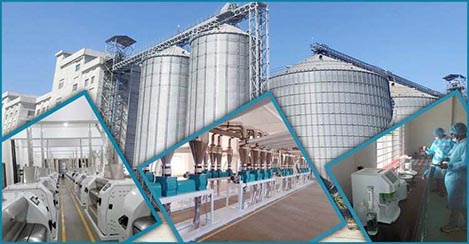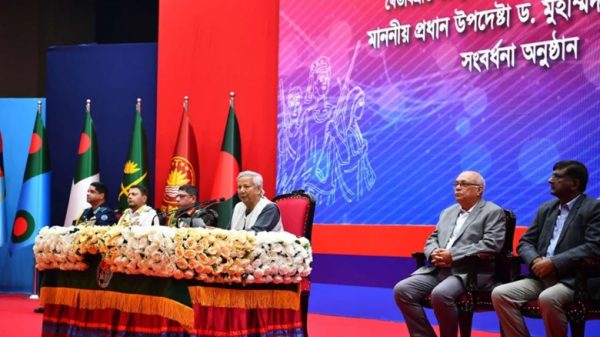PRAN-RFL’s major investment in booming FMCG sector

- Update Time : Tuesday, 12 November, 2024, 08:29 pm
- 15 Time View

Online Desk : Bangladesh’s fast-moving consumer goods (FMCG) market is expanding rapidly, driven by high demand for affordable, high-turnover items like food, beverages, and dairy. PRAN-RFL Group, already a key player in this sector, is increasing its investments to capitalize on this growth. PRAN has established a new industrial park in the Kaliganj Economic Zone, Gazipur, with an advanced flour mill that produces flour and semolina using fully automated, touch-free processes. The facility boasts a daily production capacity of 500 tonnes, powered by state-of-the-art European technology. The group plans to produce and process a wide range of products at this park, including edible oil, salt, pulses, spices, noodles, biscuits, and flexible packaging. Initial investments for this project are projected at Tk 1,500 crore, with Tk 715 crore already invested.
Industrial park overview : PRAN-RFL has established a sprawling industrial park on 180 bighas of land. This park includes a state-of-the-art, 10-storey automated flour mill, spanning 21 bighas, dedicated to producing flour and semolina. European-sourced parts and technology drive this mill, which is fully automated, managing everything from raw material unloading to product packaging and dispatch without manual intervention. Adjacent to the mill, six large steel silos line the Shitalakshya River, storing wheat, which is processed and packaged into flour before loading directly onto cargo trucks. A feed mill also operates within the park, supporting the protein sector and marking PRAN’s broader consumer goods strategy. “We aim to secure a strong position in the consumer goods market, which is why we’re advancing in products like seed crushing, edible oil, and salt,” shared Eleash Mridha, Managing Director of PRAN Group.
Production of PRAN’s Alo Poultry Feed brand is ongoing, while several other factories are conducting trial operations or completing machinery installations. Some plants are still under construction, but the flexible packaging plant, essential for bottling beverages and other products, is already operational, providing backward linkage support. Work on the salt and lentil factories is nearing completion, and the group is constructing an on-site jetty along the Shitalakshya River to streamline product logistics. With roads, dedicated product accreditation labs, and dormitories nearly finished, PRAN-RFL expects all facilities to be fully operational by next year.
So far, around 900 jobs have been created at the industrial park, with the potential for 3,000 once fully operational. Eleash Mridha explained the park’s importance: “With the growing population, food demand is rising, and FMCG presents immense potential. As the country’s largest single buyer for our production needs, we aim to use 50% of production internally, with the remainder reaching consumers directly.” Reflecting on recent challenges, he added, “The pandemic and the Russia-Ukraine war led to significant raw material costs. By investing in this industrial park, we’re reinforcing our supply chain, which will help us withstand such crises in the future.”
500 tonnes of flour and semolina daily : PRAN’s new industrial park can produce 500 tonnes of flour and semolina daily using a modern, automated flour mill. To ensure top-quality flour, wheat is imported from Russia, Ukraine, Canada, and the United States, according to PRAN’s Executive Director Naser Ahmed. “Wheat from these regions has higher protein levels,” Ahmed explained. Local wheat from districts such as Lalmonirhat, Dinajpur, Kurigram, and Panchagarh will also be sourced, with PRAN leasing 600 acres in northern Bangladesh for domestic wheat production. Ahmed detailed the production process: “To maintain quality, semolina flour undergoes multiple refining steps. Imported wheat is transferred from ships directly into the silos via lighter vessels.” The factory currently has six large silos with a 10,000-tonne capacity each and three additional 1,000-tonne silos for storage, with plans to add six more. The facility also features advanced labs for nutritional analysis, ensuring wheat quality at every stage. Initially, PRAN’s 50 kg bags are distributed to wholesale and retail stores through its dealers, and smaller 1 kg and 2 kg packets are being tested. Soon, PRAN brand flour and semolina will be widely available across Bangladesh. PRAN Group Managing Director Eleash Mridha said, “We’ve invested around Tk 110 crore in constructing the mill’s machinery and infrastructure, and we plan to double production capacity soon. A feed mill is also operational in this park, supporting our vision to gain a strong foothold in the consumer goods market. Work is progressing on additional products like edible oil, salt, and seed crushing. Within two years, we aim to offer a wide range of consumer products from PRAN.”
Salt production and lentil processing begin : PRAN’s new salt factory, with a daily production capacity of 500 tonnes, is nearing completion and will soon bring Pran and Banga salt brands to the market. Equipped with cutting-edge technology from Spain, the facility aims to deliver the highest quality refined salt available, said Naser Ahmed, PRAN’s Executive Director. “Despite many competitors in the country’s salt market, we’re entering with the latest technology to offer the best refined salt,” Ahmed stated. Additionally, the industrial park has begun large-scale processing of red lentils and mung beans under the Pran and Metro brands, with operations starting in March. The facility has a daily processing capacity of 60 tonnes for pulses. The park is also gearing up to process a range of spices, including chilli and turmeric, with a capacity of 60 tonnes per day, targeted entirely for export, according to PRAN Group Managing Director Eleash Mridha.
Competing in a diverse FMCG market : In Bangladesh’s FMCG market, domestic brands like Pran-RFL, City, Meghna, ACI, Square, TK, and Abul Khair Group dominate, while Unilever Bangladesh leads among foreign companies. Notable brands across segments include Roopchanda in edible oil, Maggi in noodles, Ispahani in tea, and Coca-Cola and Seven Up in beverages. Eleash Mridha commented on the competitive market landscape: “Increased competition benefits consumers by driving product quality and affordability. PRAN-RFL’s strength lies in its brand reputation and robust supply chain, which have earned the trust of Bangladeshi consumers. We are confident in our ability to compete effectively.”










